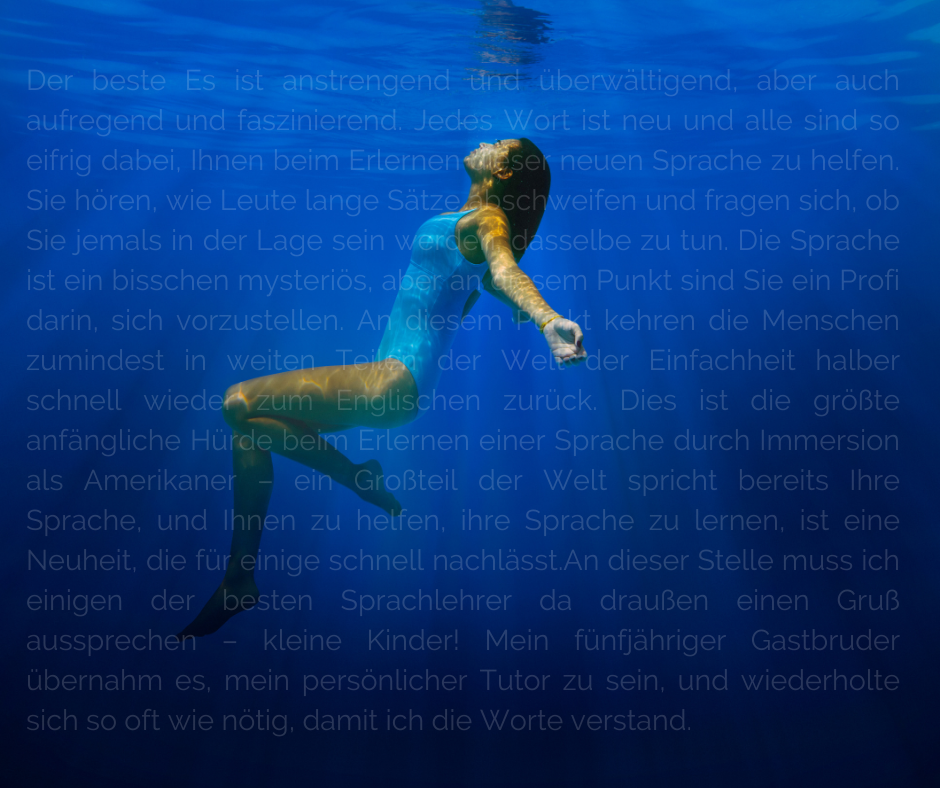When I stepped off the train in Germany and met my host family for the first time, my German vocabulary was limited to the contents of a three-week intensive language course I had just completed. Aside from introducing myself, naming fruits and vegetables, and, of course, asking where the bathroom was located, I was incapable of communicating without an animated game of charades. However, eleven months later, when I met with my American peers at our pre-departure orientation, my German had surpassed many of my friends who had taken years of German classes prior to their exchange. What was the difference? Immersion.
While classroom language classes have their place - sometimes it's nice to not need to travel halfway around the world - immersion is an entirely different experience with so many advantages, challenges, and rewards. Unlike classroom learning, immersion learning is not constantly disrupted by a return to your native language. This allows for a rapid pace of language learning and the ability to pick up a language with a minimal accent.

Classroom learners are typically stronger on the mechanics and grammar of a language while immersion learners are more comfortable in day-to-day conversation and speak more like a native.
Think of it like this: two people want to be in shape. Person #1 works a desk job and plays video games in their spare time, but they go to the gym five times a week and are disciplined about their workout routine. Person #2 is a rock-climbing guide who spends all day on the cliffs in a physically taxing environment.

While both people can achieve fitness, person #1 must be disciplined and focused on the goal, whereas person #2 will end up being fit without giving much thought to it because the pursuit of fitness is so integrated into their daily life. Additionally, person #2 will have way more fun and learn technical skills beyond operating gym equipment. Similarly, language learning will give the learner insight into dialects, slang, and humor in a fun, albeit challenging, environment.
Immersion, Stage 1
It's exhausting and overwhelming, yet exciting and intriguing. Every word is new and everyone is so eager to help you learn this new language. You hear people ramble off long sentences and wonder if you will ever be able to do the same. The language has a bit of mystery to it, but at this point, you're a pro at introducing yourself. At this point, at least in much of the world, people quickly revert back to English for convenience sake. This is the biggest initial hurdle to learning a language through immersion as an American - much of the world already speaks your language, and helping you learn theirs is a novelty that quickly wears off for some.

At this point I must give a shout out to some of the greatest language teachers out there - little kids! My five-year-old host brother took it upon himself to be my personal tutor and repeated himself as many times as necessary for me to understand the words.
Immersion, Stage 2
Once you get a chunk of vocabulary under your belt, you begin to go about day-to-day life a bit more normally. After a few months, my host family no longer relied on English in every conversation, and I felt the achievement of interacting with strangers at the store or coffee shop without getting utterly lost by their questions. This milestone helped me overcome the frustration that came from constantly feeling lost in group conversations, or wondering if I would ever be able to track lessons at school. I may have looked like an 18-year-old, but I talked like a 2-year-old. This reality kept me humble, kept me laughing, and kept me working hard to learn German.

It's at this point that staying committed to learning your host language is imperative, and reverting back to your native tongue, tempting as it may seem, will always bite you in the end.
Once I skyped with my family in the U.S. before going downstairs for dinner. At dinner, my host mom asked if I had been talking to home because my German was noticeably worse (leave it to a German to tell you to your face!😀)
Immersion: Stage 3
Language learning through immersion has a snowball effect. Once that snowball grows large enough, you suddenly feel like you are improving by leaps and bounds instead of taking baby steps. All those months of hard work start paying off and you realize that you will actually be able to function in your host language.
For me, this was around the 7-month mark. Friends, family, and teachers all commented on the dramatic change in my ability to construct grammatically correct sentences and commended me on my growing vocabulary. Some people also started teasing me for picking up local dialect words. Those comments may have only been meant as simple observations, but I took them as high praise.

If you choose to learn a language through immersion, you will be challenged and you will feel discouraged at times. But if you stick with it, you won't regret it. And I can promise you that, looking back, you will view it as one of your greatest accomplishments.
|
Being an exchange student is one of the very best ways to be fully immersed in a culture and language. You’ll learn more than you ever imagined and make memories and relationships to last a lifetime. Contact us to learn more about studying abroad with ICES. |




